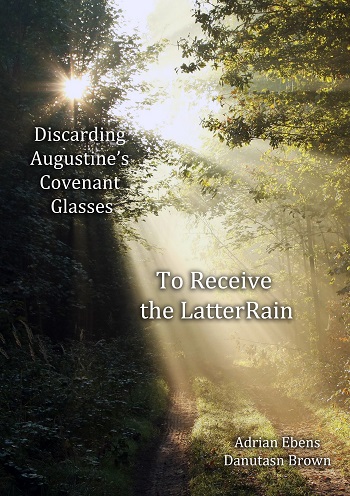Law and Grace are Inseparable Sweethearts (Discarding Augustine's Covenant Glasses Review)
https://maranathamedia.com/book/view/discarding-augustines-glasses-to-receive-the-latter-rain
I was blessed and impressed by the book Discarding Augustine's Covenant Glasses To Receive the Latter Rain. It made clear to me that Law and Grace are indeed inseparable sweethearts!
I remembered just recently a conversation I had a long time ago with some of my Baptist and Born-Again Christian friend where they said, "There is no one who can obey the law (old covenant),that is why we are no longer under the law (old covenant) but under grace (new covenant). We are saved if we just believe." They used the verse in Galatians saying that "the law was our schoolmaster" to explain that the law was "just" our guide, the one who teaches briefly and then we are done of it, cause it brought us to Jesus and now there is no use for it – for we are now under grace (new covenant).
But I had a question in my mind that troubled me: if we are now under grace (new covenant), does it mean that the law (old covenant) was already abolished and a non-issue at all, and that we are freed to do whatever we want to do? Does this mean that God still saves us despite of our present sin? But aren’t we supposed to be saved from sin so we stop sinning? If we are saved in sin, what are we saved from? Are we assuming we are spiritual when we are still in the flesh? Maybe we don’t really know what grace is, when we are unclear how sin and grace relate to each other.
This verse shows that we need to overcome sin and live according to the law:
What shall we say then? Shall we continue in sin, that grace may abound? God forbid. How shall we, that are dead to sin, live any longer therein? (Romans 6:1-2)
I was praying that God would lead me into understanding. It really is a different experience when we encounter the word of God personally, rather than by hearing it from a preacher. This book came to me as I was searching for an answer. I realized how our understanding of doctrine has a big impact in our lives in ways we often don’t understand – specifically in our character – for it is difficult to see the full cause to effect of a certain belief. Erroneous theories are really dangerous in practical results.
E.J Waggoner in The Gospel in Galatians (1888) p. 32,33 said; “Justification by faith is an individual, and not a national matter... I repeat justification by faith is something that each individual must experience for himself... There can be no Christian experience, no faith, no justification, no righteousness, that is not an individual matter. People are saved as individuals, and not as nations.”
I think we can all admit that very few of us are living a victorious, sin-free life. Why is that? Could it be that the Gospel process is not working?
There are many who claim that by the death of Christ the law was abrogated; but in this they contradict Christ's own words, “Think not that I am come to destroy the law, or the prophets.... Till heaven and earth pass, one jot or one tittle shall in no wise pass from the law.” Matthew 5:17, 18. It was to atone for man's transgression of the law that Christ laid down His life. Could the law have been changed or set aside, then Christ need not have died. By His life on earth He honored the law of God. By His death He established it. He gave His life as a sacrifice, not to destroy God's law, not to create a lower standard, but that justice might be maintained, that the law might be shown to be immutable, that it might stand fast forever.
Satan had claimed that it was impossible for man to obey God's commandments; and in our own strength it is true that we cannot obey them. But Christ came in the form of humanity, and by His perfect obedience He proved that humanity and divinity combined can obey every one of God's precepts. “As many as received Him, to them gave He power to become the sons of God, even to them that believe on His name.” John 1:12. This power is not in the human agent. It is the power of God. When a soul receives Christ, he receives power to live the life of Christ.
God requires perfection of His children. His law is a transcript of His own character, and it is the standard of all character. This infinite standard is presented to all that there may be no mistake in regard to the kind of people whom God will have to compose His kingdom. The life of Christ on earth was a perfect expression of God's law, and when those who claim to be children of God become Christlike in character, they will be obedient to God's commandments. Then the Lord can trust them to be of the number who shall compose the family of heaven. Clothed in the glorious apparel of Christ's righteousness, they have a place at the King's feast. They have a right to join the blood-washed throng.
The man who came to the feast without a wedding garment represents the condition of many in our world today. They profess to be Christians, and lay claim to the blessings and privileges of the gospel; yet they feel no need of a transformation of character. They have never felt true repentance for sin. They do not realize their need of Christ or exercise faith in Him. They have not overcome their hereditary or cultivated tendencies to wrongdoing. Yet they think that they are good enough in themselves, and they rest upon their own merits instead of trusting in Christ. Hearers of the word, they come to the banquet, but they have not put on the robe of Christ's righteousness.. COL 314.3-COL 315.
I realized that many people were diagnosing themselves and claiming they were in Christ when they had not fully allowed the law to do its work of pointing out sin. Man in the old covenant, ignoring the law, decides what they think is sin and therefore decides where he needs God in his life. Instead of allowing the process to do its full work so that we are fully made righteous, having realized the need that all needs to be given to Jesus, we accept Jesus with conditions and thus are never completely sanctified.
Without the the law, which was our schoolmaster to bring us to Christ that we might be justified by faith, we will never be convicted of sin – for by the law is the knowledge of sin. How then are we able to confess our sin to God if we didn't even know ourselves what our sin is? How will God be able to save us from sinning? Therefore we need the law to bring us to Christ in order to convict us of sin that God may work out the process of restoration in us and eventually heal us. We may try to be a good person by our own works of righteousness but we still fail, we still suffer embarrassment, we are hopeless and with that, we feel the need of a savior which is our only hope. But where(at the same time and place) sin abounded, grace did much more abound: (in our personal experience) Romans 5:20. As we realize more areas of our life that were tainted by sin, we bring it to Christ and receive more grace.
Moreover the law entered, that the offence might abound. But where sin abounded, grace did much more abound: That as sin hath reigned unto death, even so might grace reign through righteousness unto eternal life by Jesus Christ our Lord. (Romans 5:20-21)
I came to understood that as soon as there was sin, there was a Savior. The Old Covenant brought us to the New Covenant and thus to Jesus, the perfect embodiment of the law. The broken law was the schoolmaster to bring us to Christ that we might be justified by faith, for it brings conviction and a sense of wrong. Thus, if we are to disregard, neglect or reject the divine law, we will never be justified by faith. If we are to place together the two principles in a sequence within our personal experience and discard Augustinian glasses of dispensation, they reveal a beautifully divine process of restoration. That's when we can truly and deeply appreciate the grace of God in our life personally. We need to know that where there is no Law, there is No Grace! If Law is not present, Grace is absent! Thus, Law and Grace are indeed an inseparable sweethearts.







